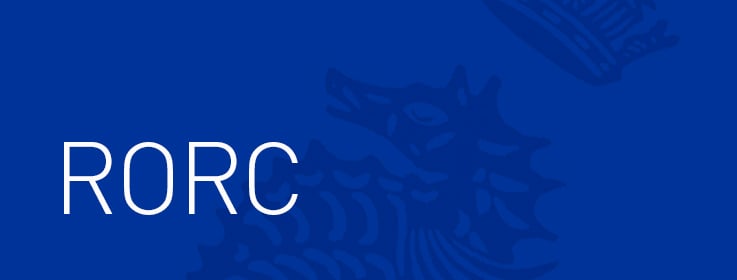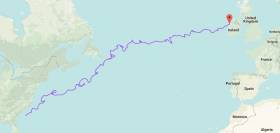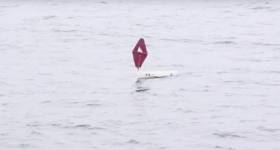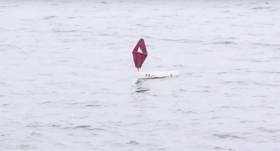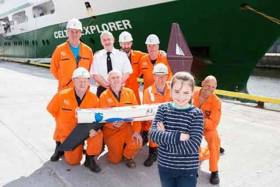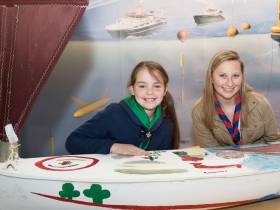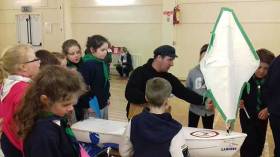Displaying items by tag: Lancer
Another Unmanned Sailboat Makes Landfall On Ireland’s West Coast
#Unmanned - School children in South Carolina in the USA are awaiting news on the whereabouts of their unmanned sailboat that made landfall in Ireland's North West this past week.
As WCSC Live 5 News reports, the miniature vessel named Cruiser was believed to be on its way to a school in Bangor Erris after reaching the Co Mayo mainland near Achill Island on Wednesday (11 October), some five months after it was launched by students at Harbor View Elementary in Charleston.
If you have any information as to Cruiser’s current whereabouts, you can get in touch with the school HERE.
The news comes six months after the miniature unmanned yacht Lancer was returned to the ocean after sailing from the north east US to Connemara — and bringing together the Connecticut high schooler behind the marine science project with the Galway girl who found the boat near her home.
In July, Lancer was tracked on a return course to Ireland. The boat finally made landfall near Plymouth in Devon last month, but its current whereabouts are unknown.
Miniature Yacht Lancer Is Heading Back To Ireland
#Lancer - The unmanned miniature yacht Lancer is heading back to Ireland – and may make landfall in Kerry or Cork within weeks.
The 1.5m boat made the news when it was found washed ashore in Connemara by local girl Méabh Ní Ghionnáin in September 2016 after a four-month transatlantic crossing from Cape Cod, where it was launched on behalf of Connecticut high schooler Kaitlyn Dow.
Before Kaitlyn and Méabh met earlier the year, Lancer was restored to working order by local sea scouts, and was relaunched from the Marine Institute’s marine science vessel RV Celtic Explorer on 22 April in the middle of the Atlantic Ocean.
Three months on, the latest tracking info shows that instead of catching currents that would have taken it either north towards Greenland or south to the Canaries, the mini yacht has found its way back into Irish waters — currently south-west of the Scilly Isles in the Celtic Sea.
The red GPS tracking line shows an interesting pattern in its movements across the ocean over the last three-plus months. The blue line, meanwhile, shows the original path of Lancer when it was launched from the US last year.
The white line shows a low-tech drifter that Kaitlyn Dow built as part of the NOAA drifters programme but was unfortunately lost at sea.
Marine Institute chief executive Dr Peter Heffernan said he was delighted that Lancer had made its way back ‘home’.
“This little boat is proving to be a great vessel promoting awareness about our ocean,” he said. :With the Atlantic being the second largest ocean in the world, it is important to increase our awareness of the value, opportunities and societal benefits the ocean provides us.
“With the Lancer currently positioned over the continental shelf, if it keeps heading towards the south-west coast we hope that it lands safely and provides another group of people the opportunity to meet and learn more about our ocean currents and winds of our seas.”
Lancer is one of a number of mini sailboats launched as part of an Atlantic Ocean Research Alliance (AORA) ocean literacy partnership to raise awareness of the Atlantic among coastal communities, and our reciprocal impact.
“If people can get the word out that the boat is approaching, maybe someone will see her,” urged Michael O’Connor, Kaitlyn Dow’s science teacher at Waterford High School.
“Instructions on what to do with the Lancer boat are inside.”
Miniature Yacht Lancer Successfully Launched In Atlantic
#Lancer - The Marine Institute has posted video of the successful launch of the unmanned yacht Lancer in the Atlantic this past weekend.
The miniature marine research vessel was released from the RV Celtic Explorer on Saturday 22 April in the middle of the Atlantic, in the hopes of it catching either the Irminger current (to take it north towards Greenland) or the Canary current (to carry it southwards towards Africa).
According to the most recent fix via the online GPS tracker, Lancer indeed appears to be headed north to continue its mission.
As previously reported on Afloat.ie, the boat was seen off from Galway by Méabh Ní Ghionnáin, who found the vessel beached near her home in Connemara last September.
The eight-year-old since met with Kaitlyn Dow, the Connecticut high schooler who launched the vessel as part of a year-long science project studying ocean winds and currents.
Méabh Ní Ghionnáin from Droim, Leitir Móir, Galway met with the Marine Institute’s scientists and crew on the RV Celtic Explorer today on her 9th birthday (18th April) to see the loading of the 1 ½ metre Lancer unmanned sailboat onto the research vessel, where it will be deployed into the middle of the Atlantic ocean during its transatlantic voyage to St John’s, Newfoundland and Labrador.
As Afloat.ie previously reported, nine months ago, in September 2016, Méabh found the Lancer boat washed ashore on her local beach after it had travelled across the Atlantic as part of a year-long research project that 18 year old Kaitlyn Dow from Connecticut, USA had undertaken. Kaitlyn had launched the boat from the USA National Oceanic and Atmospheric Administration (NOAA) research ship called the Neil Armstrong off the coast of Cape Cod earlier in May 2016. The boat was fitted with a GPS tracker and she studied its movements across the north Atlantic.
The boat successfully crossed the Atlantic on its own following the winds and currents to Ireland, and was eventually washed ashore in the Conamara County Galway, where it was found by Méabh Ní Ghionnáin, a resident of Droim, Leitir Móir. The Lancer Boat has since been repaired by Ciaran Oliver and James Rattigan from Port of Galway Sea Scouts and it is now going to be relaunched from the Marine Institute’s research vessel RV Celtic Explorer on its voyage across the North Atlantic.
Dr Margret Rae, of the Marine Institute’s and the Manager of the Canadian-EU-USA Atlantic Ocean Research Alliance (AORA-CSA), explained that the crew will deploy the Lancer boat on the 22nd April from the RV Celtic Explorer during its nine day voyage. “We hope the unmanned Lancer boat will catch the Irminger current and take it northwards towards Greenland, or the Canary current and take it southwards towards Africa.” The Irminger Current is a north Atlantic ocean current setting westward off the southwest coast of Iceland and can be tracked using the GPS at: http://www.nefsc.noaa.gov/drifter/drift_whs_2016_1.html
“It is also likely that we will get to see more of the mini boats like the Lancer landing in Ireland over the coming year. The transatlantic funded programme AORA-CSA formed a partnership in 2016 with Dick Baldwin’s Educational Passages mini-sailboats in the USA, and together are running an Atlantic Mini-boat Regatta: ‘Around the Atlantic – Our Shared Resource’. The project aims to further promote ocean literacy recognising the importance of the ocean and how it has an impact on our daily lives,” said Dr Rae.
AORA-CSA aims to promote the understanding of the value of the Atlantic Ocean by promoting transatlantic international marine research cooperation – all stemming from the historic Galway Statement on Atlantic Ocean Cooperation signed in Galway, Ireland in 2013. “Stories like Meabh and Kaitlan’s is a wonderful example of both marine science literacy and citizen engagement with the oceans – themes which are a priority for the Atlantic Ocean Research Alliance between Canada, the EU and USA. Seeing new friendships formed across the Atlantic at an early age highlights the value of international partnerships that are essential for sharing marine science” said Dr Heffernan, CEO of the Marine Institute.
With the Atlantic being the second largest ocean in the world, it is important to increase our awareness of the value, opportunities and societal benefits the ocean provides us," Dr Heffernan further said.The Atlantic Mini-boat Regatta is an exciting international demonstration of how results of ocean science and observation address pressing issues facing our citizens, the environment and the world and help to foster public understanding of the value of the Atlantic Ocean.
The research vessel RV Celtic Explorer is leaving from Galway on a transatlantic voyage to St John’s, Newfoundland and Labrador where it will be testing new equipment for multi-beam mapping of the seabed in the middle of the Atlantic as part of the transatlantic AORA-CSA project. On the Research Vessels voyage back to Galway the Marine Institute and NUIGalway will be leading a team of international scientists completing a month transatlantic ocean climate survey – GOSHIP (Global Oceans Ship-Based Hydrographic Investigations Program), learning more about climate change and its impact on the ocean.
The GO-SHIP involves the Marine Institute Ireland, with NUIGalway and research partners in UK, Germany, Canada and the US, and is another important example of the transatlantic collaboration promoted by the Atlantic Ocean Research Alliance between the EU, Canada and the USA
Transatlantic Friendship Over Unmanned US Sailboat
#Lancer - An American high school student this week made the trip across the Atlantic to meet the Galway schoolgirl who found her marine science project mini-yacht last year.
Kaitlyn Dow from Waterford High School in Connecticut met eight-year-old Méabh Ní Ghionnáin for the first time at the Marine Institute in Galway for the official handover of the unmanned Lancer sailboat, which is set to be relaunched from the RV Celtic Explorer in the Atlantic later this year.
The 1.5m boat provided by Educational Passages was used as part of Kaitlyn's year-long research project studying wind and currents in the ocean.
Fitted with a GPS transmitter, the boat was released in May 2016 by NOAA ship Neil Armstrong off the coast of Cape Cod and successfully crossed the Atlantic.
In September, Kaitlyn made an appeal to Afloat.ie readers to keep a look-out for Lancer as it was tracked as far as Galway Bay.
And when it was eventually washed up in Connemara on 20 September, Méabh was the first to find it after following its GSP signal to a spot near her home in Lettermore.
Marine Institute chief executive Dr Peter Heffernan congratulated Méabh and Kaitlyn on their endeavours, adding: "We are thrilled to be involved with the continued voyage of the Lancer sailboat where it will be launched from the research vessel RV Celtic Explorer during its up and coming transatlantic expedition in April.
"This story is a wonderful example of both science literacy and citizen engagement with the oceans – themes which are a priority for the Atlantic Ocean Research Alliance between Canada, the EU and USA.
“Seeing new friendships formed across the Atlantic at an early age highlights the value of international partnerships that are essential for sharing marine science.”
Dr Heffernan added: “With the Atlantic being the second largest ocean in the world, it is important to increase our awareness of the value, opportunities and societal benefits the ocean provides us.”
Michael O'Connor, Kaitlyn's science teacher from Waterford High School, also made the trip to Ireland wit her and her family.
"I am thrilled to see this project to the next stage bringing Méabh and Kaitlyn together,” he said. “Although this started as a science project, the social connections and the sea that binds them are just as important as the data collected.
"Kaitlyn learned to design a study from the ground up, figure out how to fund it, make the social and professional connections to further the project and foster an international dialog about the ocean.
“She has a love for sailing and turned that love into a science project with great social impact and a great story. She will carry that combined social service and love of the sea to the Coast Guard Academy next year for college.”
Lancer was repaired by Ciaran Oliver and James Rattigan from Port of Galway Sea Scouts, as previously reported on Afloat.ie.
The Sea Scouts recently visited the RV Celtic Explorer with Méabh and will also be attending a seashore safari with Galway Atlantaquaria and the Explorers Education Programme team later this month.
Five–Foot American Transatlantic Yacht Repaired By Connemara Sea Scouts
When Kaitlyn Dow of Waterford High School in Connecticut put a shout–out through Afloat.ie last September for people to look out for her unmanned yacht off the Galway coast, little did she realise she would be travelling across the Atlantic to meet those finders and be reunited with her school project.
The 5ft mini–sailboat, The Lancer, was washed up in Connemara on September 20 last year. Sent by Dow of Waterford High School in Connecticut, it travelled all the way across the Atlantic, and was picked up by Méabh Ní Ghionnáin (aged 8) on Garumna Island, Co. Galway.
Since then, the Connemara Sea Scouts, who are affiliated with the ISA’s Galway Sea Scouts, have patched up The Lancer and are preparing to send it on another voyage.
Visitors from Waterford High School are due in Connemara in late February – so more updates to come.
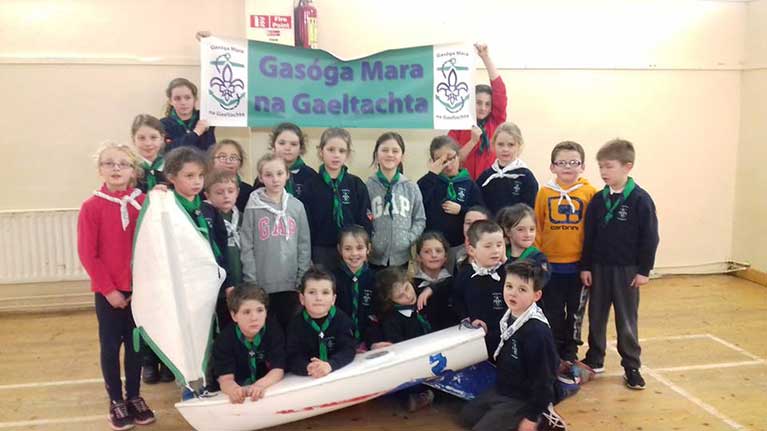 The Connemara Sea Scouts with the American mini yacht
The Connemara Sea Scouts with the American mini yacht



























